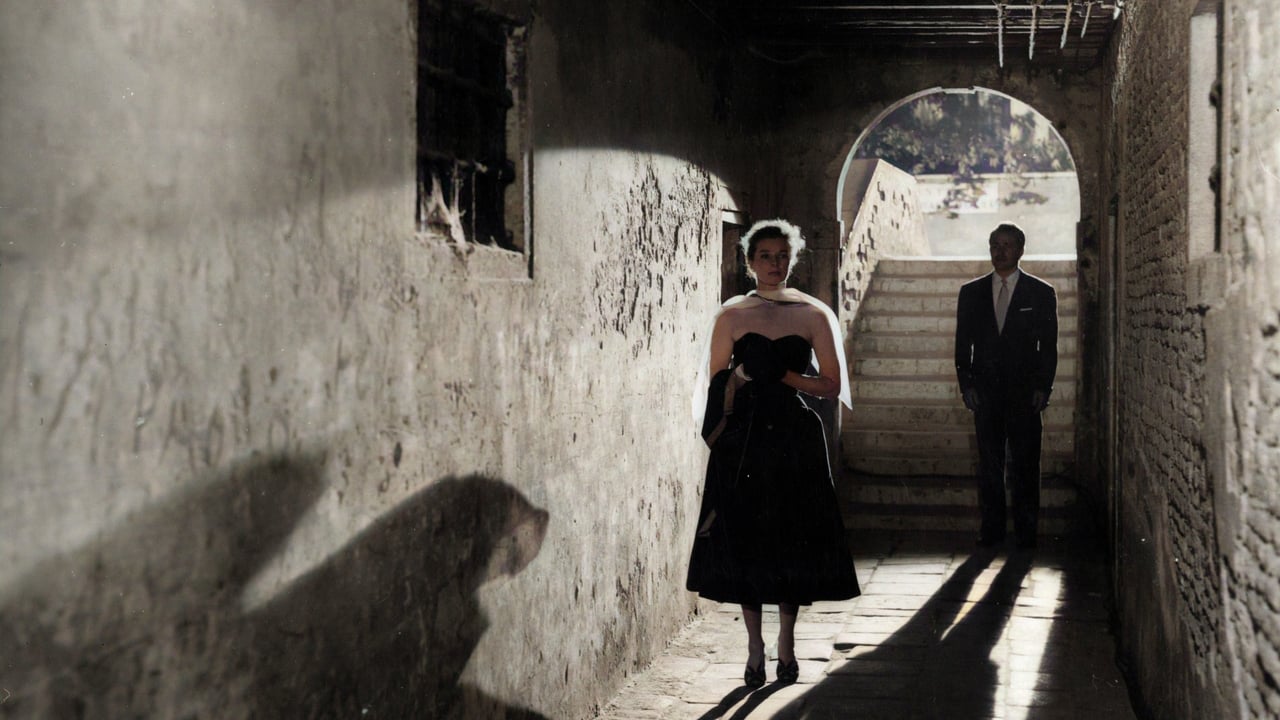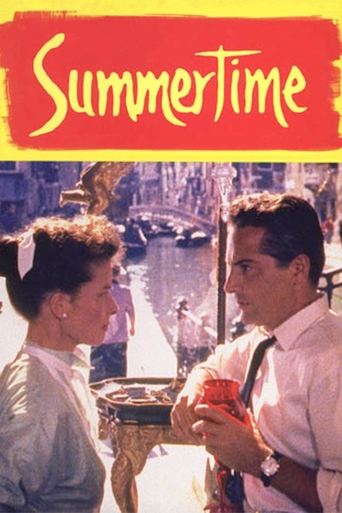

Very well executed
... View MoreSERIOUSLY. This is what the crap Hollywood still puts out?
... View MoreIt really made me laugh, but for some moments I was tearing up because I could relate so much.
... View MoreMostly, the movie is committed to the value of a good time.
... View MoreThis is part of my ongoing personal project to see all of David Lean's 18 directed movies. This particular film is sandwiched in between his early years with Coward, Dickens, and his wife (from 1949 to 1957), Ann Todd on the one hand, AND his five epic-type movies made from 1957-1984. Lean's story sources seemed to be heavily influenced by the traditional English values of Noel Coward and Terence Rattigan, even after the short 'kitchen sink' revolution of the late 50s to early 60s.For this movie, David Lean received his third of seven Oscar nominations for Best Director (with 2 wins) while Katherine Hepburn received her sixth of twelve nominations for Best Actress (with 4 wins—2 in consecutive years). Personally, I think that their nominations for this movie were the least worthy for both of them—nowhere near their other film projects. To me, this movie marked a demarcation for both Lean and Hepburn, separating each from better works from the past and setting the table for better movies yet to come.Though Lean had already made two Technicolor movies, neither were, technically, as colorful as this one. And none were quite as committed to 'out of the studio' camera shots as this one was. Here, the location was beautiful and vital to the movie's story. Further, when you think of the stunning 'on location' epics that Lean later made, you are glad that he ventured out to make this first one!!With Katherine Hepburn, audiences had not seen her vulnerable romantic side since Alice Adams. Here, she actually wears a dress and is as shy as she had been at the opening of The African Queen (1951) and would soon be in The Rainmaker (1956). This is a rare intimate story about a spinster secretary, Jane Hudson (Katherine Hepburn), who goes to Venice, more or less seeking a romantic adventure. When she finds it with a local Venetian shopkeeper, Renato de Rossi (Rossano Brazzi), and then discovers that he is a married; she first rejects it then accepts it for what it is worth---and for however long it can last.
... View MoreTo call Katharine Hepburn's Jane Hudson character in David Lean's acclaimed Summertime a sheltered woman doesn't even begin to scratch the surface of her character; calling her prudish or writing her off as shy doesn't truly summarize her well either. In the best terms I can conjure, Jane is somebody who silently craves human affection and companionship but is afraid to receive it and doesn't truly know how to reciprocate it. It reminds me of how many of my friends describe depression, as a force that basically condemns and belittles you for having know friends, yet the same mind able to create these kinds of thoughts is incapable of allowing you to remedy them in a social sense.Is Jane depressed? I don't think so. I think she's doing her best to believe she's content with being a secretary in an elementary school, a job that allows for little communication outside the realm of business. As a result, she has saved up enough money to finally take a vacation in Venice to hopefully break the monotony of her life and receive inspiration. Right off the bat, we can see Jane has done her homework on Venice and hasn't impulsively decided to take out three or four figures out of her bank account to fund a trip to a place she knows nothing about. She encounters a couple who has probably done a similar act of impulsion and rights many of the wrongs they make in judging the land and its customs before her ferry even arrives.Once there, Jane indulges in all the luxurious cafes and attractions by herself. This wouldn't be such a glaring issue if, for one, Jane looked happy whilst treating herself, or Lean's camera didn't intimately focus on the other tourists and couples indulging in the company of one another. Jane is an outsider in more ways than one here, being that she has no one to share her experiences with, and no one to come home to at night. One evening, while sitting in a cafe, Jane becomes uncomfortable with the presence of an Italian man and promptly leaves shortly after arriving.She later meets the same man, Renato de Rossi (Rossano Brazzi), at an antique shop in Venice, which he just so happens to own. The two wind up spending time together, as he shows her some of the most prized possessions in his shop. In the meantime, Jane also begins hanging out with a young boy, who often instigates or provokes her because of her lack of extroversion in social situations. The boy also serves as one of the defining forces of comic relief in the film. One particular moment where he shines involves Jane walking backwards whilst holding her camera, which she keeps close to her throughout the entire course of the film, in order to get the best shot of a landmark. As she's walking, Jane is oblivious to the river behind her, but just before she takes one step over the edge, the little boy grabs the camera right out of her hand, making no effort to save her or prevent her from falling.Summertime is one of those films that has an underlying sadness that quietly sneaks up on you as you're watching it. It's hard to notice at first, with Lean and cinematographer Jack Hildyard's sunny cinematography bleeding through the frame every chance it gets. This is one of the few films I know of that bears a disposition almost entirely built upon natural lighting, particularly in the indoor sequences, which still has a copious amount of sunshine coming through windows. Nonetheless, this device works almost as a contrast to the idea of Summertime, which is Jane's refusal to indulge in any kind of romance or happiness.It's not that Jane is happier alone - far too many times do we see her eating alone or doing some other typical social activity by herself where she looks incomplete. It's that she doesn't know how to build up a social relationship, nor does she seem to want to allow herself to get close to anyone she meets. Consider Renato, a well-meaning man who clearly sees Jane for who she is, a lonely and romantically repressed woman by her own volition rather than by circumstance. With that, Hepburn plays the character of Jane, a tricky role to put it lightly, in a superb manner. She always puts Jane's mannerisms before her own personal acting mannerisms, emphasizing Jane's very precise and specific movements that ultimately attempt to result in some sort of pleasure for herself. It's a role that is equally reliant on personal movements and patterns as it is on layered character development, and Hepburn nails both in the way she handles the role.Summertime is one of the brightest films about sadness I've yet to see; a seriously sad but ultimately charming film that works to detail the kind of alienation a person faces because of nobody other than themselves. Anchored by a fabulous performance by Hepburn and commendable cinematography, this is the kind of film that really replicates loneliness in that you can't shake it as much as you can simply recognize that something is wrong.Starring: Katharine Hepburn and Rossano Brazzi. Directed by: David Lean.
... View MoreSummertime is David Lean and Katherine Hepburn's love letter to lonely, middle aged secretaries everywhere. Although the film is rather thin and at times acts more like a tourist reel of Venice, the performances by Hepburn - the best of her work in the 1950s - and the incredibly charming and suave Rossano Brazzi makes up for the film's weak points. The film is a breezy adaptation of an Arthur Laurents play that while on paper seems to be nothing particularly special, is enlivened by Lean's vivid direction and the chemistry between Hepburn and Brazzi. She plays a lonely secretary traveling through Venice, and he is a lonely store keeper. They meet, fall in love, yet they must part because she has to return home. Hepburn's typically heavy mannerisms and her increasingly croaky voice appear only a little bit here in the beginning but after the first 10 minutes she is nothing but great. It certainly is a charming film and the last scene at a train station is just spectacular.
... View MoreThe somewhat astringent personality of Katharine Hepburn is well suited for this movie, in which she plays Jane Hudson, a middle-aged woman who has apparently been too guarded or puritanical ever to enjoy a grown-up romance. At the same time, the Rossano Brazzi character, Renato, is an opportunist, adding a dimension of realism to Jane's habitual caution and suspicion.No surprise, then, that in the end she abruptly puts a stop to their romance, even though it causes her so much pain to do so. Renato wants the romance to continue but seems to have no intention of divorcing his wife and seems heedless of the enormous gulf that separates him from Jane--different worlds, different world views. It is a bittersweet ending like that of David Lean's earlier movie, Brief Encounter.The movie has been criticized as being something of a "travelogue," but the story would have had far less meaning if it had been set in New York or even Paris. Venice is a magical place, a seemingly impossible city that nevertheless exists as a jewel on the surface of the sea. No other city could so clearly be the setting for the once-in-a-lifetime magical experience of a spinster secretary from Akron.In any case, the location filming of Venice is a delight to behold.Another likely criticism, from a feminist viewpoint, is that Jane is portrayed as less than complete without a man. I find this criticism beside the point of the film, which is that romance is an experience that most people want to have at least once in their life.
... View More